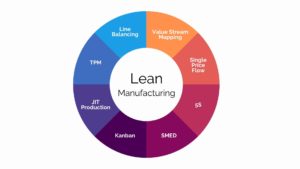Jidoka
Basically, Jidoka is a Japanese word that means giving machines human intelligence — this helps in building in quality into products. Stopping to fix problems is and developing countermeasures ultimately leads to better productivity in the long run.
But Jidoka is not only about machines that can stop themselves. In line with the TPS philosophy, Jidoka is also about people and the positive contribution they make. Though Jidoka is applied in some form or other in modern machines, in the TPS context it reflects a deeper appreciation of humans.
By applying Jidoka, you are saying to your workers that you care about them and value them. When machines are able to report their condition, humans are freed from the burden of constantly monitoring them.
Reasons Jidoka is no longer a necessary Lean Manufacturing Tool
The main reason why Jidoka is important is because of humans. When you remove humans from the equation, the tool is not as powerful as before.
With the increase of machines that can do human work and can self-diagnose, aspects of Jidoka that require human intervention have become obsolete.
Here are my three reasons I think Jidoka is an over-rated lean tool.
1. Machines already stop by themselves when there is an error
As I mentioned above, the capabilities of machines is improving every other day. When modern machines detect a problem, they stop and technicians are on hand to provide solutions.
This is unlike previously where there is an operator trained in problem detection who pulls the andon cord so that further production is halted.
With sensors becoming smaller, more effective and cheaper, giving the machines the ability to see errors is now very common.
2. Machines can now investigate the root cause of problems
Diagnostic features in machines make them capable of problem analysis as they have enough data. In traditional Jidoka, when a problem occurs, the team go through a root cause analysis and try to come up with solutions.
But in a work situation people are more likely to place the blame on others rather than themselves. So if a root cause analysis places the problem in close proximity to their function, most people will opt to sweep them under the carpet.
It is only in a well matured lean environment that you will find people owning their problems. Most organizational cultures are based on blaming mentality. They cannot execute the root cause analysis required for them to find effective countermeasures
3. Machines can self repair
Using machine learning in particular and artificial intelligence, machines can be taught to repair themselves. This will take away the need for service technicians especially those that deal with complex machinery.
Using computers to gather large amounts of data and then using that data for predictive and preventive maintenance obfuscates the need for human intervention. A machine repairman is better than a human one as humans are known to be blinded by their biases.
The field of robotics has greatly improved and robots have gained human dexterity
Conclusion
Now the readers who know me as a lean fanatic must be wondering why I am giving Jidoka a bad name. It is not that I have stopped being a lean disciple.
The main aim of this article is to open up your mind to the fact that technology is changing everything. The tools we use in lean manufacturing are important. But we must remember that the tools (such as Jidoka) are just a manifestation of the thinking and principles.



